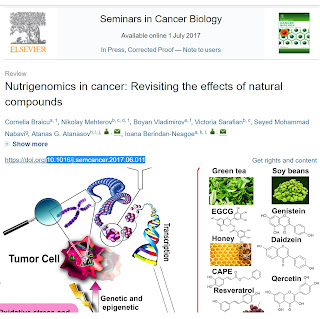Abstract
Nutrigenomics effects have an important role in the manipulation of dietary components for human benefit, particularly in cancer prevention or treatment. The impact of dietary components, including phytochemicals, is largely studied by nutrigenomics, looking at the gene expression and molecular mechanisms interacting with bioactive compounds and nutrients, based on new 'omics' technologies. The high number of preclinical studies proves the relevant role of nutrigenomics in cancer management. By deciphering the network of nutrient-gene connections associated with cancer, relevant data will be transposed as therapeutic interventions for this devastating pathology and for fulfilling the concept of personalized nutrition. All these are presented under the nutrigenomics canopy for a better comprehension of the relation between ingested phytochemicals and chemoprevention or chemotherapy. The profits from the nutrigenomics progress, with a particular focus on the coding and noncoding genes related to the exposure of natural compounds need to be validated. A precise attention receives the evaluation of the role of natural compounds in tandem with conventional therapy using genomic approaches, with emphasis on the capacity to inhibit drug resistance mechanisms. All these relevant nutrigenomics aspects are summarized in the present review paper. It is concluded that further nutrigenomics studies are required to improve our understanding related to the complex mechanisms of action of the natural compounds and for their appropriate application as gears in cancer therapy.
Conclusion and perspectives
It is clear that these natural phytochemicals act as key signaling molecules as one might observe from the nutrigenomics pattern of these molecules. In spite of the increased number of investigations, the results remain inconclusive, and only few cases are implemented into clinical trials. These preclinical data are useful and can serve as a base for developing novel antitumor agents, with superior pharmacologically and biologically active effects. The failure of some clinical trials can be justified by the lack of natural matrices retrieved in the natural source. The enriched plant extract can be delivered in a partially oxidized form, due to the low stability of these natural phytochemicals. The genomic investigation allows the biological elucidation of the capacity of phytochemicals to modulate transcriptomics profiles, which is a highly complex task. An important role in the validation of preclinical data on clinical trials is to consider the environmental risk factors that might affect the disease model making the validation on humans very difficult. The different toxic environmental exposure is a major component of genomic studies related to natural compounds as benefactors in cancer neoadjuvant chemotherapy. This might create a different response rate, or a combination of toxic agents with phytochemicals. An important role is played by epigenetic events and their
relationship with transcription factors. Prior to become a true daily reality, nutrigenomics is anticipated to validate proof of concept for its main identified mechanisms, and then to be implemented in clinical practice. Diverse pro/contra opinions were addressed to natural phytochemicals, based on genomics evaluation. These missing puzzle pieces make it difficult to assess whether a particular phytochemical has an overall positive or negative effect on cell proliferation. The further application of genomic approaches will elucidate the different molecular mechanisms targeted, and will allow the identification of the doses having chemopreventive/therapeutic or detrimental effects. There is no doubt about the benefit of these natural compounds in human health and in the same time it is very difficult to ignore the controversial data due to the extensive range of experimental and preclinical models used for the evaluation the biological effect. These discrepancies can be reduced with the development of a natural product database and standardization of the protocols. The process of novel drug discovery or drug design from natural products is based on the integration of nutrigenetics and nutrigenomics data. The natural compounds have multifaceted properties due to the heterogeneity of the different molecular structures that are retrieved from natural sources. In spite of all these difficulties it is important to introduce in daily practice the concept of personalized diet that supports the chemotherapeutic treatment.
Full text access
(the full text can also be obtained directly from the authors)
Braicu C, Mehterov N, Vladimirov B, Sarafian V, Nabavi S, Atanasov AG, Berindan-Neagoe I. Nutrigenomics in cancer: revisiting the effects of natural compounds. Semin Cancer Biol. 2017 Jul 1. pii: S1044-579X(17)30171-2. doi: 10.1016/j.semcancer.2017.06.011. Review. PubMed PMID: 28676460.
http://www.sciencedirect.com/science/article/pii/S1044579X17301712
Keywords relevant for this post: natural products, food ingredients, medicinal plants, scientific studies, patients, research, clinical science, pathophysiology, health, biochemistry, diet, food, dietary ingredients, foods, healthy lifestyle, herbal medicine, botanicals, phytotherapy, natural product, phytochemistry, pharmacognosy, phytochemicals, phytonutrients, flavonoids, phytochemical supplements, phytonutrient supplements, polyphenols, bioactivity, bioactive compounds, food and nutrition, nutrition, nutritional supplements, cancer, nutrigenomics.

My husband is 80 years and has been suffering from PD for the past 15 years. Lately he started hallucinating and I didn't know how to handle the situation. He cannot sleep and tried to find and catch the imaginary people who he thinks are real. he was taken Entacapone with Levodopa, Carbidopa, and Pramipexole and started physical therapy to strengthen muscles. nothing was really working to help his condition.I took him off the Siferol (with the doctor’s knowledge) and started him on parkinson’s herbal formula i ordered from Health Herbal Clinic, his symptoms totally declined over a 5 weeks use of the Parkinsons disease natural herbal formula.i read reviews from other previous patients who used the herbal formula, my husband is now active, he can now go about daily exercise!! his symptoms so much reduced that now I hardly notice them.Visit there website www.healthherbalclinicc.weebly.com or email Info@healthherbalclinic.net
ReplyDeleteYou deserve a huge thanks for this wonderful post.This is really an excellent post.thanks
ReplyDeleteclipping path service
Photo Retouching services
Raster To vector conversion
I really like your writing style, superb information,
ReplyDeleteclipping path service
Officinalisinin I is extracted from the rhizomes of Anemarrhena asphodeloides Bunge. Officinalisinin I
ReplyDelete